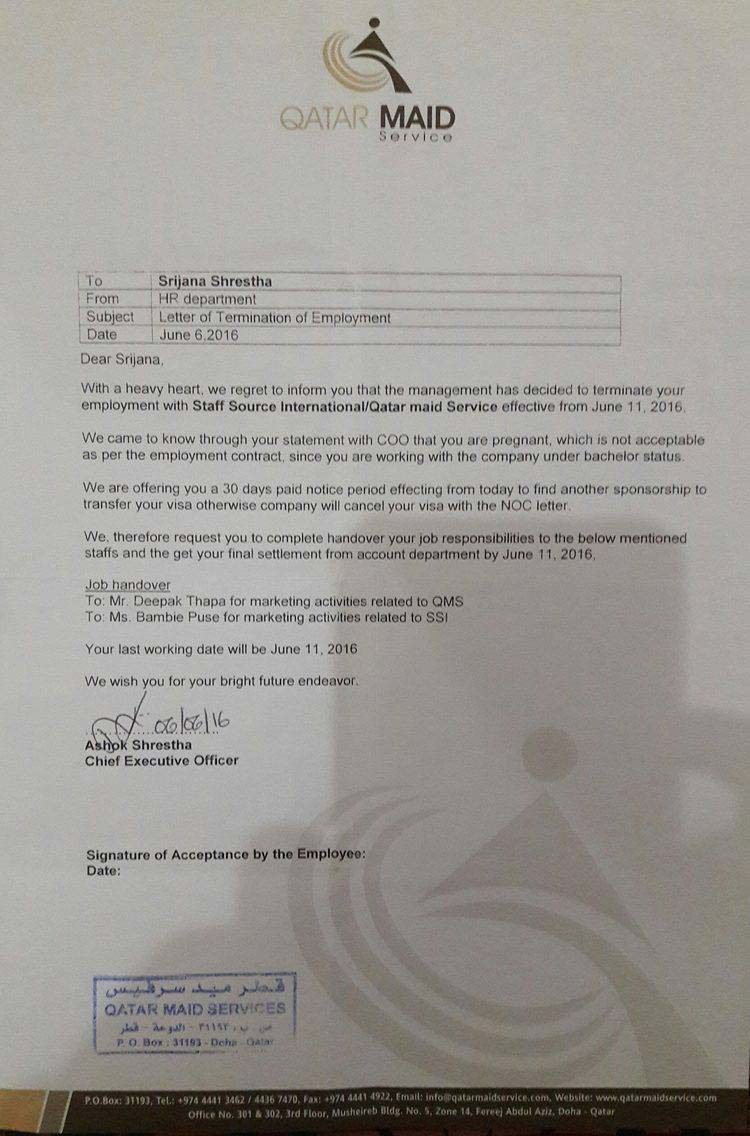
With reporting by Riham Sheble
A 32-year-old woman who lost her job in Qatar after becoming pregnant is taking her former boss to court for unfair dismissal.
Srijana Shrestha worked in an online marketing role at recruitment firm Staff Source International, an affiliate of Qatar Maid Service.
The Nepali expat was fired in May, two weeks after telling her employer that she and her husband were going to start a family.
In her termination letter, CEO Ashok Shrestha (no relation) wrote:
“We came to know through your statement with COO that you are pregnant, which is not acceptable as per the employment contract, since you are working with the company under bachelor status.”
‘Clear violation’
However, Article 98 of Qatar’s Labor Law states that companies are not allowed to fire female workers if they become pregnant.
Speaking to Doha News, legal consultant Abdallah Yusuf said that Srijana Shrestha’s case thus amounts to wrongful dismissal, and is a “clear violation” of the law.
Shrestha said officials at Qatar’s National Human Rights Committee (NHRC) and lawyers at the country’s Labor Court agreed.
“The lawyer I spoke to at the court said ‘you are legally married, and you are living with your husband, what’s the issue? There’s nothing in your contract saying you cannot get pregnant.’ “
She added that she has lodged a court case in hopes that other women in her position would be encouraged to speak out.
Legal status
Shrestha had originally arrived in Qatar on a family visit visa, sponsored by her husband.
But her husband’s salary was too low for him to sponsor any family members, so he gave her a no-objection certificate so Qatar Maid Service could become her sponsor.
About a year into her two-year contract, Shrestha informed her boss about her good news.
“I told them as soon as I found out,” she said. “The hospital requires you to come for so many visits and I didn’t want to lie to the company to attend them. I thought they would be happy for me.”
However, her employer claimed to be unaware of her marital status.

Speaking to Doha News, company COO Narkaji Gurung said that her residence permit, acquired through the company, was not a “married visa.”
He added that her dismissal was standard practice for women hired on these terms at his company:
“She was doing ok, she got on very well, and then unfortunately she got pregnant,” Gurung told us. “We have more than 300 Filipino and Nepalese women working here as cleaners for us, and whoever gets pregnant, they go.”
However, Shrestha’s job does not involve cleaning, and she insists that her boss knew that she was married.
And even if she did have a cleaning role, lawyer Yusuf said that no woman in Qatar should be fired for becoming pregnant.
“Stipulating that a female employee not get married or pregnant is flagrant opposition to the legislator’s will and intention in writing (the labor law) and a violation of the letter of the law,” he said.
He added that a female employee is not obliged to announce her pregnancy when she is hired in Qatar.
Dismissal
When she was fired, Shrestha was apparently told that she would have to leave her job because she would be unable to carry out her duties, which involved driving around Qatar carrying out site visits.
“(Gurung) said you are pregnant and you need to take care of yourself, you can’t travel,” she recalled, continuing:
“I was very shocked when they said that to me. I asked why they were treating me like I’m a disabled person. I’m completely fine. Are they saying that pregnant women should stay within four walls and not go anywhere?”
Gurung, meanwhile, said that Shrestha was the one who expressed concerns about being on the road while pregnant because driving here is so dangerous.
He added that he and the company’s CEO concluded that they “could not take any risk” with Shrestha, due to road conditions and Qatar’s hot climate.

He said that he suggested she either work from home on freelance projects, or leave the company and then come back as an employee after the baby was born.
But Shrestha rejected these arrangements because she needed a full-time salary and wanted to be paid during her pregnancy and maternity leave, as per the Labor Law.
This would have entitled her to take leave of up to 50 days, because she had worked for her company for more than one year.
Discrimination
Shrestha filed a case against her employer in June, and attended her first court hearing in July.
But due to the timing of Ramadan this year and the court’s subsequent long summer break, her next appearance is not scheduled to take place until October.
This means that she will be seven months’ pregnant by the time the case comes to court again. Such delays could discourage other women from pursuing lawsuits, she said.

In addition to being a stressful experience, the job loss means Shrestha no longer has a valid health card or RP. She must thus fly back to Nepal to deliver her baby.
The expat has now given her husband power of attorney so that he can take care of her case while she’s gone, but Shrestha said she is angry that the couple will be apart for the birth of their first child:
“This has broken my family. Not to have my husband by my side is the worst feeling a wife could go through,” she said.
For his part, Gurung said that he felt he had treated Shrestha “like my daughter” and said that her response to her termination came “out of the blue.”
Compensation
According to Yusuf, who is not involved in this case, Shrestha’s dismissal is a form of sexual discrimination.
It violates article 35 of the constitution of Qatar, “which declares everyone equal before the law,” along with article 93, which enshrines equality between female and male employees in the workplace.
“Thus, any female worker (especially the case in question) who has been wrongfully dismissed because of pregnancy has the right to sue her employer and demand compensation for this wrongful dismissal,” he said.
Since her termination, the company has offered Shrestha a settlement of QR10,000, which she has not accepted.
Instead, she is hoping the court awards her the full amount she says is owed to her.
This is for the remaining salary, leave pay and allowances for the rest of her contract – a sum of almost QR100,000.

Shrestha also said that she wants the court to hand out “harsh” punishment to her employers.
Furthermore, she hopes that the publicity surrounding her case will encourage other women in the same position to come forward.
Shrestha said that when she spoke about her job termination on a Facebook group for mothers in Qatar, she received a lot of support from women who had also lost their jobs in similar circumstances.
“A lot of women are scared and they just go back to their country without reporting the case,” Shrestha said. “But the women I have spoken to say this case needs to be reported so that more women don’t suffer.
Thoughts?







